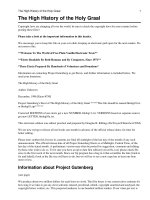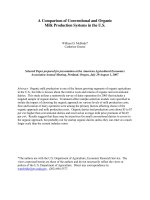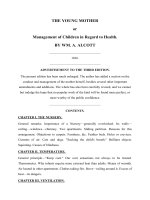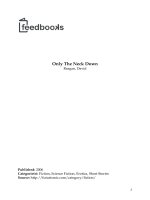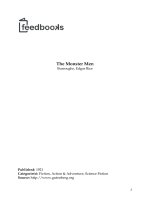The Lost Warship pot
Bạn đang xem bản rút gọn của tài liệu. Xem và tải ngay bản đầy đủ của tài liệu tại đây (337.79 KB, 78 trang )
The Lost Warship
Williams, Robert Moore
Published: 1943
Categorie(s): Fiction, Science Fiction, Short Stories
Source: />1
About Williams:
Robert Moore Williams (1907—1977), born in Farmington, Missouri,
was an American writer, primarily of science fiction. His first published
story was Zero as a Limit, which appeared in Astounding Science Fiction
in 1937, under the pseudonym of "Robert Moore". He was a prolific au-
thor throughout his career, with his last novel appearing in 1972. His
"Jongor" series was originally published in Fantastic Adventures in the
1940s and 1950s, but only appeared in book form in 1970.
Also available on Feedbooks for Williams:
• Planet of the Gods (1942)
• Be It Ever Thus (1954)
• The Next Time We Die (1957)
• Thompson's Cat (1952)
Copyright: Please read the legal notice included in this e-book and/or
check the copyright status in your country.
Note: This book is brought to you by Feedbooks
Strictly for personal use, do not use this file for commercial purposes.
2
Transcriber Note: This etext was produced from Amazing Stories Janu-
ary 1943. Extensive research did not uncover any evidence that the U.S.
copyright on this publication was renewed.
3
Chapter
1
The sun came up over a glassy, motionless sea. In the life-boat, Craig ar-
ranged the piece of sail to protect them from the sun. He hoisted it to the
top of the improvised mast, spreading it so that it threw a shadow on the
boat. There was no wind. There had been no wind for three days.
Craig stood up and swept his eyes around the circle of the sea. The ho-
rizon was unbroken. As he sat down he was aware that the girl, Margy
Sharp, who had been sleeping at his feet, had awakened.
"See anything, pal?" she whispered.
He shook his head.
Her pinched face seemed to become more pinched at his gesture. She
sat up. Her eyes went involuntarily to the keg of water beside Craig. She
licked her parched, cracked lips.
"How's for a drink, pal?" she asked.
"A quarter of a cup is all we get today," Craig said. "Do you want your
share now or will you wait and take it later?"
"I'm terribly thirsty," the girl said. She glanced quickly back at the oth-
ers in the boat. They were still sleeping.
"How about slipping me a whole cup?" she asked, her bold blue eyes
fixed intently on Craig's face.
Craig looked at the sea.
"They're asleep," the girl said quickly. "They won't ever know."
Craig said nothing.
"Please," the girl begged.
Craig sat in silence. He was a big man with a great thatch of black hair
and hard gray eyes. He was clad in a pair of torn duck trousers. Rolled
bottoms revealed bare feet. He wore no shirt. Holstered on his belt was a
heavy pistol.
"Look, big boy," the girl cajoled. "Me and you could get along all
right."
"What makes you think so?" Craig questioned.
This was apparently not the answer she had expected. She seemed to
be startled. For a moment her eyes measured the man.
4
"You've been looking for something that you wanted very badly," she
said. "You haven't found it. Because you haven't found it, you have be-
come bitter."
Her words made Craig uncomfortable. They came too close to the
truth. He shifted his position on the seat.
"So what?" he said.
"So nothing," the girl answered. "Except that we are two of a kind."
"And because we are two of a kind, we can get along?" he questioned.
"Yes," she answered. She made no effort to hide the longing in her
eyes. "Look, Craig, me and you, we're tough." She gestured contemptu-
ously at the others in the boat. "They aren't tough."
"Aren't they?"
"No." The words came faster now, as if she had made up her mind to
say what she had to say and be damned with the consequences. "They're
going to die. Oh, you needn't shake your head. You haven't fooled me
for a minute with your pretending there will be a ship along to pick us
up. There won't be a ship. Our only hope is that we may drift ashore on
an island. It may be days before we find an island. There isn't enough
water to keep us all alive that long. So—"
She couldn't quite finish what she had to say. Craig watched her, his
eyes cold and unrevealing. Her gaze dropped.
"So why don't you and I split the water and let the others die of thirst
because we are tough and they aren't? Is that what you mean?" he asked.
"No—" She faltered. "N—no." Defiance hardened her face. "Yes!" she
snapped. "That's what I mean. Why should we take care of them? We
don't owe them anything. Why should we die with them? What have
they—or anybody else—ever done for us? I'll tell you the answer. Noth-
ing. Nothing! Nothing!"
"Because they have done nothing for us and because we are the
stronger, we let them die. Is that what you mean?"
"Y—yes."
Craig sat in silence for a moment. Dark thoughts were in his mind but
his face showed nothing. "I have a gun," he said, "the only gun in the
boat. That makes me the boss. Why don't I keep all the water for myself
and let the rest of you die of thirst?"
"Oh, you wouldn't do that!" Fright showed on her face.
"Why wouldn't I?" Craig challenged.
"Because—oh, because—"
5
"What have you got to offer me that is worth a cup of water?" he
demanded.
"What have I got that you want?" she answered. Her eyes were fixed
hungrily on Craig's face.
"What have you got that I want! Oh, damn it, girl—" The big man twis-
ted uncomfortably. He avoided her gaze, looking instead at the glassy
sea.
"Is it time to wake up?" a new voice asked. It was the voice of Mrs.
Miller, who had been lying in the middle of the boat. She raised herself
to her knees, looked around at the glassy sea. "I thought—" she
whispered. "For a moment I thought I was home again. I guess I must
have been—dreaming." She pressed her hands against her eyes to shut
out the sight of the sea.
"Is it time to have a drink?" she said, looking at Craig.
"No," he said.
"But we always have a drink in the morning," Mrs. Miller protested.
"Not this morning," Craig said.
"May I ask why? Are we—are we out of water?"
"We still have water," Craig answered woodenly.
"Then why can't I have some? I—well, I guess I don't need to tell you
why I need a drink."
The reason she needed water was obvious. Worse than anyone else in
the boat, Mrs. Miller needed a drink.
"Sorry," Craig shook his head.
"Why?"
"Well, if you must know," Craig said uncomfortably. "Margy and I
have decided to keep all the water for ourselves."
"Damn you, Craig!" Margy Sharp said quickly.
"You two have decided—to keep all the—water?" Mrs. Miller said
slowly, as if she was trying to understand the meaning of the words.
"But what—what about the rest of us?"
"It's too bad for the rest of you," Craig said. He was aware that Margy
Sharp was gazing frantically at him but he ignored her. Picking up a tin
cup, he held it under the faucet in the side of the keg. A thin stream of
water trickled out. He filled the cup half full, and handed it to Margy
Sharp.
"Drink up," he said. "Double rations for you and me."
The girl took the cup. She looked at Craig, then glanced quickly at
Mrs. Miller. Her parched lips were working but no sound came forth.
6
She looked at the water and Craig could see the movement of her throat
as she tried to swallow.
Mrs. Miller said nothing. She stared at Craig and the girl as if she did
not understand what she was seeing.
"Damn you, Craig," Margy Sharp said.
"Go on and drink," the big man answered. "That's what you wanted,
isn't it?"
"Y—yes."
"Then drink!"
"Oh, damn you—" Tears were in the girl's eyes. While Craig watched
woodenly, she turned and crawled back to where Mrs. Miller was sitting.
"Craig was only teasing," she said gently. "He's a great teaser. He
meant for you to have the water all the time. Here, Mrs. Miller, this is for
you."
"Thank you, dear; thank you ever so much." Mrs. Miller drank the wa-
ter slowly, in little sips. Margy Sharp watched her. Craig could see the
girl trembling. When the last drop was gone, she brought the cup back to
Craig—and flung it in his face.
"I could kill you!" she gasped.
"I gave you what you wanted," he said. His voice was impersonal but
the hardness had gone from his eyes.
Sobbing, Margy Sharp collapsed in the bottom of the boat. She hid her
face in her hands.
"Here," Craig said.
She looked up. He had drawn a fourth of a cup of water and was hold-
ing it toward her.
"I—I gave my share to Mrs. Miller," she whispered.
"I know you did," Craig answered. "This is my share."
"But—"
"Water would only rust my stomach," he said. "Take it."
The girl drank. She looked at Craig. There were stars in her eyes.
He leaned forward and patted her on the shoulder. "You'll do, Margy,"
he said. "You'll do."
The boat floated in the glassy sea. The long ground swell of the Pacific,
marching aimlessly toward some unknown shore, lifted it steadily up
and down, giving the boat the appearance of moving. An empty tin can,
thrown overboard three days previously, floated beside the boat. A
school of flying fish, fleeing from some pursuing maw beneath the sur-
face, skipped from wave to wave.
7
Besides Craig, Margy Sharp, and Mrs. Miller, there were three other
persons in the boat, all men. They were: English, a blond youth; Michael-
son, a little bird of a man who seemed not yet to have comprehended
what had happened to them, or to care; and Voronoff, whose chief dis-
tinguishing characteristic was a pair of furtive eyes. English had been
wounded. He sat up and looked over the side of the boat. Pointing, he
suddenly cried out:
"Look! Look! There's a dragon! A flying dragon!"
"Easy, old man," Craig said gently. For two days English had been de-
lirious. The infection that had developed in his wound was quite beyond
the curative powers of the simple medicines carried among the emer-
gency stores of the life boat.
"It's a dragon!" the youth shouted. "It's going to get us."
He stared at something that he could see coming through the air.
Craig drew his pistol. "If it comes after us, I'll shoot it," he said, dis-
playing the gun. "See this pistol."
"That won't stop this dragon," English insisted. "Oh—oh—" His eyes
widened with fright as he watched something coming through the sky.
He ducked down in the bottom of the boat, hid his face in his hands.
Men, caught unprotected in the open by a bombing raid, threw them-
selves to the ground like that, while they waited for the bombs to fall. A
few minutes later, English looked up. Relief showed on his face.
"It's gone away," he said. "It flew over and didn't see us."
"There was no danger," Craig said gently. "It wouldn't have harmed
us. It was a tame dragon."
"There aren't any tame dragons!" the youth said scornfully. He was
looking again at the sea. "There's a snake!" he yelled. "A huge snake! It's
got its head out of the water—"
"Poor kid," Margy Sharp whispered. "Can't we do something for him?"
"I'm afraid not," Craig answered. "But you might take him some wa-
ter." He poured a generous share into the cup, watched the girl take it to
the youth, who drank it eagerly.
Michaelson and Voronoff, awakened by the hysterical cries of the
youth, were sitting up. Michaelson stared incuriously around him, like a
bird that finds itself in a strange forest and wonders how he got there.
Then he pulled a small black notebook out of his pocket and began
studying it. Ever since he had been in the life boat he had been studying
the contents of the notebook, ignoring everything else.
8
"What's the idea of wasting water on him?" Voronoff said sullenly,
nodding his head toward English. Margy Sharp was holding the cup to
the youth's lips.
"What?" Craig was startled.
"He's done for," Voronoff asserted. He seemed to consider the state-
ment sufficient. He did not attempt to explain it.
A cold glitter appeared in Craig's eyes. "So why waste water on him?"
he questioned. "Is that what you mean?"
"That's exactly what I mean," Voronoff answered. "Why waste water
on a dead man? We don't have any too much water anyhow."
"Go to hell!" Craig said contemptuously.
"You can say that because you've got the gun," Voronoff said.
Craig's face turned gray with anger but he controlled his temper. "If
you think you can taunt me into throwing the gun away, you are mis-
taken," he said. "In the meantime, I have issued water to everyone else
and I assume you and Michaelson will want your shares. If you will
come aft, one at a time, I will see that you get it."
"Water?" said Michaelson vaguely. He had paid no attention to the ar-
gument. When he heard his name mentioned, he looked up and smiled.
"Water? Oh, yes, I believe I would like some." He came aft and Craig
held the tin cup under the faucet in the keg. The water rilled out very
slowly. Craig stared at it in perplexity. The stream dried to a trickle, then
stopped running.
Horror tightened a band around his heart. He lifted the keg, shook it,
then set it down.
Michaelson gazed at the few drops of water in the cup. "What is the
matter?" he asked. "Is this all I get?"
"The keg is almost empty!" Craig choked out the words.
"Empty?" Michaelson said dazedly. "But yesterday you said it was a
quarter full!"
"That was yesterday," Craig said. "Today there isn't over two cups of
water left in the keg."
Silence settled over the boat as he spoke. He was aware that four sets
of eyes were gazing steadily at him. He picked up the keg, examined it to
see if it were leaking. It wasn't. When he set it down, the eyes were still
staring at him. There was accusation in them now.
"You were the self-appointed guardian of the water supply," Voronoff
spat out the words.
Craig didn't answer.
9
"Last night, when we were asleep, did you help yourself to the water?"
Voronoff demanded.
"I did not!" Craig said hotly. "Damn you—"
Voronoff kept silent. Craig looked around the boat. "I don't know what
happened to the water," he said. "I didn't drink it, that's certain—"
"Then what became of it?" Michaelson spoke.
He seemed to voice the question in the minds of all the others. If Craig
had not taken the water, then what had happened to it? It was gone, the
keg didn't leak, and he had been guarding it.
"And here I thought you were a good guy," Margy Sharp said, moving
aft.
"Honestly, I didn't drink the water," Craig answered.
"Honestly?" she mocked him. "No wonder you were so generous about
giving me your share this morning. You had already had all you wanted
to drink."
Her voice was bitter and hard.
"If you want to think that, I can't stop you," Craig said.
"I hope you feel good while you stay alive and watch the rest of us die
of thirst," the girl said.
"Shut up!"
"I won't shut up. I'll talk all I want to. You won't stop me either. Do
you hear that? You won't stop me!"
She was on the verge of hysteria. Craig let her scream. There was noth-
ing he could do to stop her, short of using force. He sat silent and im-
passive on the seat. Hot fires smouldered behind his eyes. In his mind
was a single thought: What had happened to the water?
The boat drifted on the sullen sea. Michaelson, after trying to compre-
hend what had happened, and failing in the effort, went back to study-
ing the figures in the notebook. Voronoff furtively watched Craig. Eng-
lish had lapsed into a coma. Mrs. Miller huddled in the middle of the
boat. She watched the horizon, seeking a sail, a plume of smoke, the
sight of a low-lying shore. Margy Sharp had collapsed at Craig's feet. She
did not move. Now and then her shoulders jerked as a sob shook her
body.
"Well," thought Craig, "I guess this is it. I guess this is the end of the
line. I guess this is where we get off. What happens to you after you're
dead, I wonder?"
He shrugged. Never in his life had he worried about what would hap-
pen after he died and it was too late to begin now.
10
He was so lost in his thoughts that he did not hear the plane until it
had swooped low over them. The roar of its motor jerked his head to the
sky. It was an American naval plane, the markings on its wings revealed.
The occupants of the boat leaped to their feet and shouted themselves
hoarse. The pilot waggled his wings at them and flew off.
Against the far horizon the superstructure of a warship was visible. It
was coming closer. Craig put his fingers to his nose, wiggled them at the
sea.
"Damn you, we beat you," he said.
He knew they hadn't beaten the sea. Luck and nothing else had
brought that warship near them. Luck had a way of running good for a
time. Then it ran bad.
11
Chapter
2
When the Sun Jumped
"The captain wishes to see you, sir," the sailor said.
Craig snubbed the cigarette and rose to his feet. He had eaten and
drank sparingly, very sparingly indeed. They had tried to take him to the
hospital bay with the others, but he had gruffly refused. There was noth-
ing wrong with him that a little food and water wouldn't cure.
He followed the sailor to the captain's quarters. Unconsciously he
noted the condition of the ship. She was a battleship, the Idaho, one of
the new series. Craig guessed she was part of a task force scouting the
south Pacific. She was well kept and well manned, he saw. The men
went about their tasks with a dash that was heartwarming.
The captain was a tall man. He rose to his feet when Craig entered his
quarters, smiled, and held out his hand, "I'm Captain Higgins," he said.
Craig looked at him, blinked, then grinned. He took the out-stretched
hand.
"Hi, Stinky," he said. "It's good to see you again."
"Stinky!" Higgins choked. "Sir—"
"Don't get stuffy," Craig said, laughing.
Higgins stared at him. Little by little recognition began to dawn on the
captain's face. "Craig!" he whispered. "Winston Craig! This calls for a
drink."
"It does, indeed," Craig answered.
Captain Higgins provided the whiskey. It was Scotch. They drank it
straight.
"Where on earth have you been?" Higgins asked.
"Gold," Craig said. "Borneo." A frown crossed his face. "Our little
brown brothers came down from the north."
"I know," said Higgins grimly. "They came to Pearl Harbor too, the
little—. They ran you out of Borneo, eh?"
"I got out," Craig said.
"But this life-boat you were in? What happened?"
12
"Jap bombers happened. They caught the ship I was on. Luckily we
managed to get a few boats away—"
"I see. Where are the other boats?"
"Machine-gunned," Craig said. "A rain squall came along and hid us so
they didn't get around to working on the boat I was in." He shrugged.
"We were ten days in that boat. I was counting the jewels in the Pearly
Gates when your task force came along. But enough about me. What
about you?"
Higgins shrugged. "What you can see," he said.
Craig nodded. He could see plenty. The boy who had been known as
"Stinky" in their days at Annapolis was boss of a battle wagon.
"I heard you resigned your commission within a year after we had fin-
ished at the Academy," Higgins said.
"Yes," Craig answered.
"Mind if I ask why?"
"Not at all. I just wanted some action and it didn't look as if I could get
it in the Navy. So—"
It was not so much what Craig said as what he left unsaid that was im-
portant. He was a graduate of the Naval Academy at Annapolis. He and
Stinky Higgins had finished in the same class. Higgins had stayed with
the Navy. Craig had not been able to endure the inactivity of belonging
to a fighting organization when there was no fighting to be done. He was
born with the wanderlust, with itching feet, with the urge to see what lay
beyond the farthermost horizon.
"So you were prospecting for gold?" Captain Higgins asked.
"Yes."
"What are you going to do now, if I may ask?"
"Well," Craig said, "I was on my way back to the States, to join up
again, if they would take me."
Higgins grinned. "If they would take you? They will grab you with
open arms. They could use a million like you."
"Thanks," Craig said.
A knock sounded on the door.
"What is it?" Higgins said to the aide who entered.
"One of the men we picked up in the life-boat wants to see you, sir."
"What about?"
"He would not say, sir. He insists it is of the utmost importance. His
name is Michaelson, sir. Shall I show him to your quarters?"
"Very well. I'll see him immediately."
13
The aide saluted smartly and left.
"Who is this Michaelson?" Higgins said to Craig.
"I don't know," Craig shrugged. "Just one of the passengers in the life-
boat. We didn't ask each other for pedigrees. About all I can say about
him is that he is a queer duck." Craig explained how Michaelson had
been constantly studying the contents of the notebook he carried.
The captain frowned. "There is a Michaelson who is a world-famous
scientist," he said. "I don't suppose this could be he."
"Might be," Craig said. "This is the south seas. You never know who is
going to turn up down here or what is going to happen." Abruptly he
stopped speaking. A new sound was flooding through the ship.
It had been years since he had heard that sound yet he recognized it
instantly. The call to action stations! It could have only one meaning. The
Idaho was going into action. Something thrilled through Craig's blood at
the thought. He turned questioning eyes toward the captain.
Higgins was already on the phone.
"Flight of Jap bombers approaching," he said, flinging the phone back
on its hook. "Come on."
This was probably the first time in naval history that a bare-footed,
bare-headed man, whose sole articles of clothing consisted of a pair of
dirty duck trousers, joined the commanding officer of a battleship on the
captain's bridge. Captain Higgins didn't care what Craig was wearing,
and his officers, if they cared, were too polite to show it. They didn't
really care anyhow. They had other things on their minds.
Far off in the sky Craig could see what the officers had on their minds.
A series of tiny black dots. They were so far away they looked like gnats.
Jap bombers. Big fellows. Four-engined jobs.
The notes of the call to action stations were still screaming through the
ship. The Idaho, at the touch of the magic sound, was coming to life.
Thirty-five thousand tons of steel was going into action. Craig could feel
the pulsation as the engines kicked the screws over faster. The ship
surged ahead. Fifteen hundred men were leaping to their stations. The
guns in the big turrets were poking around, hoping that somewhere off
toward the horizon there was a target for them. The Idaho was a new
ship. She was lousy with anti-aircraft. The black muzzles of multiple
pom-poms were swinging around, poking toward the sky.
An officer was peering through a pair of glasses. "Seventeen of them,
sir," he said. "I can't be certain yet, but I think there is another flight fol-
lowing the first."
14
The Idaho was part of a task force that included a carrier, cruisers, and
several destroyers. Craig could see the carrier off in the distance. She had
already swung around. Black gnats were racing along her deck and leap-
ing into the sky. Fighter planes going up. Cruisers and destroyers were
moving into pre-determined positions around the carrier and the Idaho,
to add the weight of their anti-aircraft barrage to the guns carried by the
big ships.
"Three minutes," somebody said in a calm voice. "They've started on
their run."
The anti-aircraft let go. Craig gasped and clamped his hands over his
ears. He had left the Navy before the advent of air warfare. He knew the
roar of the big guns in their turrets but this was his first experience with
the guns that fought the planes. The sound was utterly deafening. If the
fury of a hundred thunder-storms were concentrated into a single area,
the blasting tornado of sound would not be as great as the thunder of the
guns. The explosions beat against his skull, set his teeth pounding to-
gether. He could feel the vibrations with his feet.
High in the sky overhead black dots blossomed like death flowers
blooming in the sky.
The bombers kept coming.
The anti-aircraft bursts moved into their path. Death reached up into
the sky, plucking with taloned fingers for the black vultures racing with
the wind. Reached and found their goal. One plane mushroomed out-
ward in a burst of smoke.
Craig knew it was a direct hit, apparently in the bomb bay, exploding
the bombs carried there. Fragments of the plane hung in the sky, falling
slowly downward.
Up above the anti-aircraft, midges were dancing in the sun—fighter
planes. They dived downward.
Abruptly a bomber fell out of formation, tried to right itself, failed. A
wing came off. Crazily the bomber began spinning.
Black smoke gouted from a third ship. It began losing altitude rapidly.
The others continued on their course.
Michaelson suddenly appeared on the bridge.
How he got there, Craig did not know, but he was there, jumping
around and waving his notebook in the air. Michaelson was shouting at
the top of his voice.
"—Danger!—Must get away from here—"
Craig caught the shouted words. The thundering roar of the anti-air-
craft barrage drowned out the rest.
15
No one paid any attention to Michaelson. They were watching the sky.
The planes had released their bombs.
For some reason they were not attacking their normal target, the carri-
er. Perhaps a second flight was making a run over the carrier. The first
flight was bombing the battleship.
The Idaho was their target.
Craig could feel the great ship tremble as she tried to swerve to avoid
the bombs. A destroyer would have been able to spin in a circle but
35,000 tons of steel do not turn so easily.
The bombs were coming down. Craig could see them in the air, little
black dots growing constantly larger. Fighter planes were tearing great
holes in the formation of the bombers. Few of the Jap ships would ever
return to their base. But their job was already done.
The bombs hit.
They struck in an irregular pattern all around the ship. Four or five
were very near misses but there was not one direct hit. Great water-
spouts leaped from the surface of the sea. A sheet of flame seemed to run
around the horizon. It was a queer, dancing, intensely brilliant, blue
flame. It looked like the discharge from some huge electric arc.
Even above the roar of the barrage, Craig heard the tearing sound.
Somehow it reminded him of somebody tearing a piece of cloth. Only, to
make a sound as loud as this, it would have to be a huge piece of cloth
and the person tearing it would have to be a giant.
The blue light became more intense. It flared to a brilliance that was
intolerable.
At the same time, the sun jumped!
"I'm going nuts!" the fleeting thought was in Craig's mind. He
wondered if a bomb had struck the ship. Was this the nightmare that
comes with death? Had he died in the split fraction of a second and was
his disintegrating mind reporting the startling fact of death by telling
him that the sun was jumping?
The sun couldn't jump.
It had jumped. It had been almost directly overhead. Now it was two
hours down the western sky.
Tons of water were cascading over the bow of the ship. Waves were
leaping over the deck. The Idaho seemed to have sunk several feet. Now
her buoyancy was asserting itself and she was trying to rise out of the
sea. She was fighting her way upward, rising against the weight of the
water.
16
A wind was blowing. There had been almost no wind but now a gale
of hurricane proportions was howling through the superstructure of the
ship.
A heavy sea was running. The sea had been glassy smooth. Now it
was covered with white caps.
The bombs had exploded, a blue light had flamed, a giant had ripped
the sky apart, a gale had leaped into existence, the sea had covered itself
with white capped waves, and the sun had jumped.
Craig looked at the sky, seeking the second flight of bombers. The air
was filled with scudding clouds. There were no bombers in sight.
The anti-aircraft batteries, with no target, suddenly stopped firing.
Except for the howl of the wind through the superstructure, the ship
was silent. The silence was so heavy it hurt the ears. The officers on the
bridge stood without moving, frozen statues. They seemed paralyzed.
The ship was running herself.
"W—what—what the hell became of those Jappos?" Craig heard a
dazed officer say.
"Yeah, what happened to those bombers?"
"Where did this wind come from?"
"There wasn't any wind a minute ago."
"Look at the sea. It's covered with white caps!"
"Something happened to the sun. I—I'm almost positive I saw it
move."
Dazed, bewildered voices.
"What the devil became of the carrier?" That was the voice of Captain
Higgins.
"And the rest of the force, the cruisers and destroyers—what became
of them?"
Craig looked toward the spot where he had last seen the carrier. She
had been launching planes.
He did not believe his eyes.
The carrier was gone.
The cruisers and destroyers that had been cutting foaming circles
around the carrier and the battleship—were gone.
The surface of the sea was empty. There weren't even any puffs of ex-
ploding shells in the sky.
The Idaho plunged forward through strange seas. From horizon to ho-
rizon there was nothing to be seen. The task force to which the ship be-
longed and the attacking Jap planes had both vanished. The group of
17
officers responsible for the ship were dazed. Then, little by little, their
long training asserted itself and they fought off the panic threatening
them. Captain Higgins ordered the ship slowed until she was barely
moving. This was to protect them from the possibility of hitting sub-
merged reefs or shoals. The first question was—what had happened?
Captain Higgins ordered radio silence broken. The ship carried powerful
wireless equipment, strong enough to reach to the mainland of America,
and farther.
The radio calls brought no response. The radio men reported all they
could get on their receivers was static. No commercial and no radio sig-
nals were on the air. This was impossible.
In growing bewilderment, Captain Higgins ordered a plane catapulted
into the air, to search the surrounding sea. Meanwhile routine reports
from all parts of the ship showed that the Idaho had suffered no damage
of any kind from the bombing. She was in first-class shape. The only
thing wrong with her was the men who manned her. They were be-
wildered. Defeat in battle they would have faced. They would not have
flinched if the ship had gone down before superior gun power. They
would have fought her fearlessly, dying, if need be, in the traditions of
their service.
Craig was still on the bridge with Captain Higgins and the other of-
ficers. Although he did not show it, he was scared. Right down to the
bottoms of his bare feet, he was scared. He watched the scouting plane
catapulted into the air, and the grim thought came into his mind that
Noah, sending forth the dove from the ark, must have been in a similar
position. Like Noah, Captain Higgins was sending forth a dove to search
the waste of waters.
Besides Craig, there was another civilian on the bridge, Michaelson.
Nobody was paying any attention to him. Normally, if he had intruded
without invitation to this sacred spot, he would have been bounced off
so fast it would have made his head swim. But the officers had other
things to think about besides a stray civilian who had popped out of
nowhere. Michaelson, after fluttering vainly from officer to officer and
getting no attention, turned at last to Craig. Michaelson was waving his
note book.
"These men will pay no attention to me," Michaelson complained, nod-
ding toward the officers.
"They got troubles," Craig said. "They've run into a problem that is
driving them nuts."
18
"But I could help them solve their problem!" Michaelson said, irritation
in his voice.
"Aw, beat it—Huh? What did you say?" Craig demanded.
"I can tell them what happened, if they will only listen. I was trying to
warn them, before it happened, but I was unable to reach the bridge in
time."
"You—you know what happened?" Craig choked.
"Certainly!" Michaelson said emphatically.
Craig stared at the little man. Michaelson did not look like he had
much on the ball but he spoke excellent English, and even if he was a
queer duck, he seemed to be intelligent. Craig remembered that Michael-
son had been trying to reach the bridge just before the bombers struck,
also that the man had been trying to get in touch with the captain just be-
fore the warning sounded that the bombers were approaching. Craig
turned to the officers.
"Captain Higgins," he said.
"Don't bother me now, Craig," the captain snapped.
"There's a man here who wants to talk to you," Craig said.
"I have no time—" For the first time, the captain saw Michaelson.
"Who the devil are you?" he snapped. "What are you doing on my
bridge?"
"He's the man who wants to talk to you," Craig explained. "His name
is Michaelson."
Michaelson smiled shyly. "You may have heard of me," he said.
"Are you Michaelson the scientist, the man who is called the second
Einstein?" Higgins demanded.
Michaelson blushed. "I am a scientist," he said. "As for being a second
Einstein, no. There is only one Einstein. There can be only one. But it
may be that I can help you with your problem."
Craig saw the attitude of the officers change. They had heard of Mi-
chaelson. It was a great name. Until then they had not known that he
was on their bridge. They became respectful.
"If you can help us, shoot," Higgins said bluntly.
"I will try," the scientist said. He pursed his lips and looked thought-
ful. "If you are familiar with geology you unquestionably know
something about 'faults'. 'Faults' are unstable areas on the surface of the
earth, places where, due to joints or cracks in the underlying strata of
rocks, slippage is likely to take place. There is, for instance, the great San
Andreas Rift, in California, which is a 'fault'."
19
"Sorry, Mr. Michaelson," Higgins interrupted. "If you've got something
to say, say it, but don't start giving us a lecture on geology."
"In explaining the unknown, it is best to start with what is known," the
scientist answered. "Earth faults are known. When I talk about them, you
will understand me. However, there is another kind of fault that is as yet
unknown, or known only to a few scientists who suspected its exist-
ence—" He paused. "I am referring to the space-time fault."
The faces of the officers registered nothing. Craig frowned, but
listened with quickened interest. A space-time fault! What was Michael-
son talking about?
"You will not find a space-time fault mentioned in any scientific treat-
ise," Michaelson continued. "There is no literature on the subject, as yet.
Certain erratic phenomena, of which the apparent slowing of the speed
of light in certain earth areas was the most important, led a few scientists
to speculate on the existence of some strange condition of space and time
that would account for the observed phenomena. The speed of light is re-
garded as being constant, yet in certain places on earth, for no apparent
reason, light seemed to move slower than it did elsewhere. What was the
reason for this strange slow-down? Investigation revealed the existence
of what I have called a space-time fault."
"Please, Mr. Michaelson," Captain Higgins spoke. "We are not scient-
ists. With all respect to your ability, I must request you to come directly
to the point."
"Very well," the scientist said. "We have fallen into a space-time fault. I
have been conducting certain researches in and near this area in an effort
to locate the boundaries of what I had hoped would be called—since I
discovered it—the Michaelson Fault. Under ordinary circumstances the
ship would, in all probability, have passed directly through the fault,
though I suspect, from certain data of ships that have disappeared mys-
teriously, that all ships have not always passed through the fault. In our
case, the explosion of the bombs was sufficient to cause a momentary
dislodgment of the space-time balance in this area, with the result that
we were precipitated through the fault."
He paused and looked expectantly at his audience. It was his impres-
sion that he had made a complete explanation of what had happened. He
expected the officers to understand. They didn't understand.
Craig, watching in silence, caught a vague glimpse of what the scient-
ist was saying. He felt a cold chill run up and down his spine. If he un-
derstood Michaelson correctly—
20
"We were precipitated through the fault?" a lieutenant spoke. "I don't
follow. What do you mean, sir?"
"Mean?" Michaelson answered. "I mean we passed through the fault."
"But what does that mean?"
"That we have passed through time!"
Craig was aware of a mounting tension when he heard the words.
Then he had understood Michaelson correctly! He had been afraid of
that. He saw from the faces of the officers that they either did not com-
prehend what the scientist had said, or comprehending, were refusing to
believe.
"Passed through time!" somebody said. "But that is ridiculous."
Michaelson shrugged. "You are thinking with your emotions," he said.
"You are thinking wishfully. You hope we have not passed through time.
Therefore you say it is not true."
"But," Captain Higgins spoke, "if we have passed through time, how
far have we gone, and in what direction?"
"How far I cannot say," Michaelson answered. "There is little question
of the direction: We have gone back. A space-time fault can only slip
back. It cannot slip forward, or I cannot conceive of it slipping forward.
As to the distance we have gone, in space, a few feet. In time, the dis-
tance may be a hundred thousand years. It may be a million years, or ten
million." He tapped his notebook. "I have much data here, but not
enough data to determine how far we have gone."
Craig was cold, colder than he had ever been in all his life. They had
passed through time! Desperately he wanted to doubt that the scientist
knew what he was talking about. His eyes sought the reassurance of the
battleship. Surely such a mass of steel could not pass through time!
But—the sun had jumped, a hurricane of wind had roared out of
nowhere and was still roaring through the rigging of the ship. The calm
sea had become storm-tossed. And—the radio was silent.
Was Michaelson right? Or was he a madman? Craig could not grasp
completely the reasoning of the scientist. A space-time fault sounded im-
possible. But there was no question about the existence of earth faults.
Craig had seen a few of those areas where the foundations of the earth
had crumpled. If the inconceivable pressures of the planet could crush
miles of rock like he could crush a playing card in his hands, why could
not the more tenuous fabric of space-time be crushed also?
21
The faces of the officers reflected doubt. Craig saw them steal uneasy
glances at each other, saw them glance at the bulk of the battleship for
reassurance. The ship was their world.
Out of the corner of his eyes Craig saw something coming across the
sea. At the same time, in the forepeak, a lookout sang out.
"I'm afraid," Craig said, pointing, "that now there is no doubt that Mr.
Michaelson is right. Look there."
Sailing down the wind was a gigantic bird-lizard. With great fanged
beak out-stretched, it was flapping through the air on leathery wings. It
was a creature out of the dawn of time.
It proved, by its mere existence, that Michaelson was right.
The Idaho, and all her crew, had passed through a space-time fault in-
to an antediluvian world!
22
Chapter
3
The Return of the Dove
There were dozens of the great bird-lizards flapping about the ship. Eith-
er they thought it was an enemy, to be attacked and destroyed, or they
thought it was something to eat. In either event, it was to be attacked.
They were attacking it. They would circle it, flap heavily to a point
above, then launch themselves into a glide, fanged mouth open, scream-
ing shrilly.
The anti-aircraft gunners knocked the beasts out of the air with ease.
On the bridge a group of tense officers watched the slaughter without
being greatly interested in it. They knew that the guns of the Idaho were
proof against any creature of earth, sky, or water, in this world. They
were not afraid of the beasts of this strange time into which they had
been thrust.
The scouting plane was still out, searching the waste of water for land.
The officers of the Idaho were all thinking the same thing. Captain
Higgins put their thoughts into words.
"Mr. Michaelson," the captain said slowly. "I can't argue with you. I am
forced to believe that somehow we have been forced back in time.
However I am charged with the responsibility for this ship. Back where
we came from, the Idaho is needed. I want to get her back where she be-
longs. How can we accomplish this?"
The scientist hesitated. He did not want to say what he had to say. He
shook his head. "I question whether or not we can accomplish it," he said
at last.
"But we have to return!" Higgins protested.
"I know," Michaelson said sympathetically. "The problem is how!"
"You mean there is no way to return?"
The scientist shrugged. "If there is, I do not know of it."
"But can't you make any suggestion? After all, this is your field. You're
a scientist."
23
"This is my field but even I know little or nothing about it. Almost
nothing is known about the true nature of the space-time continuum.
Only recently have we even guessed that such things as space-time faults
existed. We were hurled through this particular fault by accident, the
result of an unfortunate combination of circumstances. Whether we can
duplicate that accident, and whether it would return us to our own
time—I just don't know. Nobody knows."
The officers of the Idaho received this information with no sign of
pleasure. Craig felt sorry for them. After all, some of them had wives, all
of them had friends back in the United States. Or was it forward in the
United States, in the America that was to be? It was hard to remember
that Columbus had not as yet sailed westward, would not sail westward
for—how many hundreds of thousands of years?
All human history would have to unroll before there was an America.
If the theory of continental drift was correct, there might not even be an
American continent, it might still be joined to Europe. Babylon and
Nineveh, Karnak and Thebes, Rome and London—there were no such
cities in the world, would not be for—
The men on this ship were probably the only human beings alive on
earth! Men had not yet become human, or maybe hadn't. The Neanderth-
al Man, the Cro-Magnons, maybe the Java Man, the Piltdown Man, had
not yet appeared on the planet!
"As I understand it," an officer said, "we were sailing directly across a
space-time fault when the explosion of the bombs sent us through the
fault? Is that correct?"
"That is correct," Michaelson answered.
"Then why don't we locate this fault and set off some explosions of our
own?" the officer suggested. "Is there any chance that we might re-
turn—home—that way?"
"I don't know," the scientist frankly answered. "Maybe it would work,
maybe it won't. We can certainly try it, and if it fails, nothing is lost.
Meanwhile I will go over my data and see if I can find some way of ac-
complishing what we desire."
Michaelson went below. The Idaho was brought around. Immediately
a worried officer posed another problem.
"How are we going to find that fault?" he asked. "We can't see it. We
can't feel it. How are we going to know when we have reached the right
place?"
24
"We'll search the whole area," Higgins said. "We haven't moved far
and locating the fault ought not to be too difficult. For that matter, we
are probably still in it."
The officers moved quickly and efficiently to put his orders into execu-
tion. The plan was to put the ship in the same position she had occupied
when the bombs struck, then use the small boats to plant explosive
charges in the water around the battle wagon, charges which could be
electrically exploded from the ship. Captain Higgins moved to where
Craig was standing. He took off his cap and wiped perspiration from his
forehead.
"What do you make of this?" he asked.
Craig shrugged. "I pass," he said.
"But—one minute we were part of a task force and Jap bombers were
having a go at us. The next minute—" Higgins looked helpless. "Damn it,
Craig," he exploded, "things like that can't happen!"
"They aren't supposed to happen," the big man grimly answered. "We
just saw one of them happen."
"But—" Higgins protested, "surely we would have known about these
space-time faults, if they existed. Other ships would have fallen into
them."
"Maybe other ships have fallen into them," Craig suggested. "In the
last war the Cyclops vanished without a trace. There have been other
ships, dozens of them, that have disappeared. And, for that matter, how
is the commander of your task force going to handle the disappearance
of the Idaho?"
"I don't know," Higgins muttered.
"He is going to have to report the loss of the battleship. What will he
say?"
"What can he say?"
"He'll search the area, for survivors and wreckage. When he finds
neither the only conclusion he can reach will be that the Idaho was in-
stantaneously sunk with the loss of all hands. Remember we were under
attack at the time. Remember that intense blue light that flared around
the horizon? To the men in the other ships that light may have looked
like an explosion of the magazines of the Idaho. The admiral command-
ing your task force may report that a bomb seemingly passed down the
smoke stack of the Idaho and the resulting explosion touched off the
powder magazine."
25


